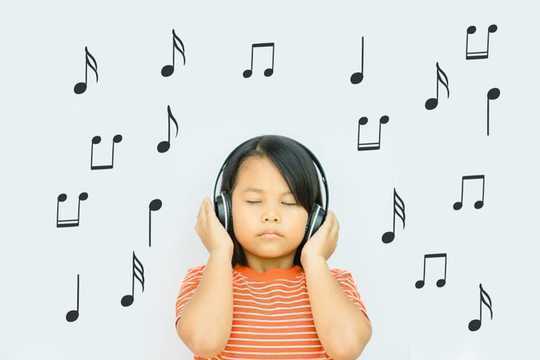
Tuning in. Shutterstock/MIA Studio
According to the NHS, as many as one in eight children aged five to 19 faces a mental health challenge. And a significant number of these cases are related to some form of anxiety.
Of course, a degree of anxiety or worry may be a normal state of affairs for young people – particularly when moving schools, or around exam time. But for some, anxiety can affect every aspect of their daily lives.
One effective method of providing support for this anxiety is music therapy, where music becomes the main tool the therapist uses to connect and work with the patient. This kind of therapy has been shown to be effective when treating children and young people living with anxiety based disorders.
After all, lots of young people love listening to music, and the music choices they make can be closely tied to their sense of self and identity. During times of stress and worry, research indicates that young people have an innate sense of the kinds of music they need to listen to.
Get The Latest By Email
It is also a particularly adaptable form of therapy. Research suggests that young people’s “passionate commitment” to songs and genres of music can shift depending on the situation.
A track like Taylor Swift’s Dancing with Our Hands Tied, for example, could be first heard as a love song, then as a break-up song, and then again as a song of triumph and survival. This demonstrates a complex and adaptable set of emotional interactions with music, and shows how it can offer support in ever changing situations.
Making it up
In a music therapy session, the therapist might use a variety of accessible instruments, such as drums, small percussion instruments and keyboards, as well as apps to put together beats and loops, to make music with the child. Songwriting is also a good option, perhaps taking an existing song and changing the lyrics to fit the current situation, or composing an original song.
When I worked in the NHS at a facility for young people with psychological difficulties, I found a combination of structured musical activities and improvisation useful – especially with those who experienced anxiety due to the unpredictability of social situations.
Using improvisation in a safe setting helped with the idea of making things up as you go along, and feeling more comfortable with this as a concept. To all intents and purposes, that is essentially what many social situations require.
There are other proven benefits, too. A clinical trial called Music in Mind based in Northern Ireland used music therapy to individually treat children and young people with behavioural problems and mental health needs. It found improvements in communication, self esteem and social functioning.
Other studies have seen positive results in the combined use of cognitive behavioural therapy (CBT) and music therapy.
As well as its supportive value, music therapy can help young people develop their skills of emotional regulation – the mechanism which allows us to function in our daily lives, managing difficult situations by adjusting our emotional responses to events and feelings.
Developing emotional regulation skills is key to reducing the risks of psychological challenges later on, and can begin in early childhood with interactive musical play.
Here, the music therapist and child play games in which both take turns to be in charge of the music. Having the chance to signal “stop” and “go”, as well as choosing whether the music will be loud or soft gives the child a chance to see how it feels be in charge.
A positive note
They are also able to explore how the differences in music make them feel. An American study using this method showed a considerable improvement in emotional regulation scores, suggesting that using music in playful activities can have very positive effects on young children.
It is clear, then, that there is potential for a spectrum of practice in the use of music to support children and young people who live with anxiety disorders.
Listening to preferred music and using that experience to explore feelings and moderate anxiety is at one end of the spectrum. The early use of music in pre-school and school settings can also help develop ER, building resilience in children to adverse life events.
If disorders develop, music can be used as a tool to explore emotions and work towards understanding, with music therapy being offered as a treatment to those who need more focused clinical support.
So perhaps we all need to be thinking about the use of music in managing anxiety in our children and young people. There is a wealth of evidence emerging as to its effectiveness – which we can all tune in to.![]()
About the Author
Elizabeth Coombes, Senior Lecturer in Music Therapy, University of South Wales
This article is republished from The Conversation under a Creative Commons license. Read the original article.
books_leisure








